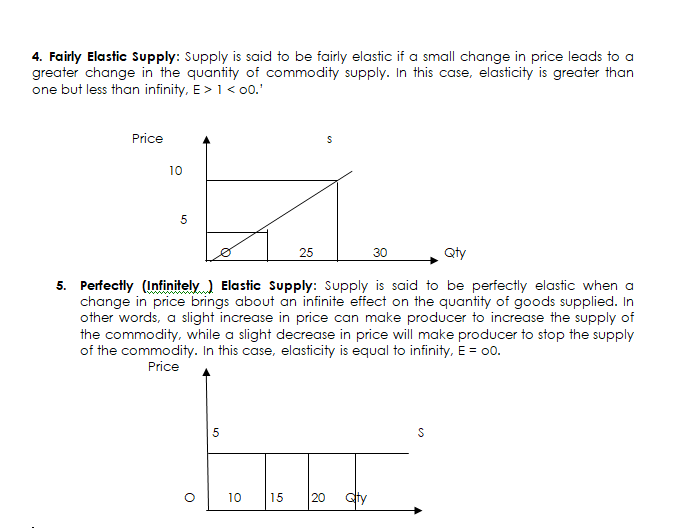Back to: ECONOMICS SS2
Welcome to class!
In today’s class, we will be talking about the elasticity of supply. Enjoy the class!
ELASTICITY OF SUPPLY

CONTENT
- Meaning of Elasticity of Supply.
- The formula for Calculating Elasticity of Supply.
- Graphical Illustration of Elasticity of Supply.
DEFINITION
The elasticity of supply can be defined as the degree of responsiveness of change in quantity supplied as a result of a change in price. The elasticity of supply measures the extent to which the quantity of a commodity supplied by a producer changes as a result of a little change in the price of the commodity.
MEASUREMENT OF ELASTICITY OF SUPPLY
The elasticity of supply can be measured or calculate by using the coefficient of price elasticity of supply. The formula used in calculating the elasticity of supply is :
The elasticity of supply (ES) = % change in supply
% change in price = %∆QS
% ∆P
where ∆ = Change
QS = Quantity supplied
P = Price
% = Percentage
The table below shows the relationship between the prices of goods and the unit of the commodity supplied.
Price (N) Quantity Supplied
9 850
10 1000
11 1,150
- Calculate the elasticity of supply when the price falls from N10.00 to N9.00 State whether the supply in (iii) above is elastic or inelastic (WASSCE 1994)
New Qty – Old Qty x 100
Old Qty 1
Old Quantity = 1000
New Quantity = 850
New – Old x 100
Old 1
850 – 1000 x 100
1000 1
150 x 100 = 15%
1000 1
Old Price = N10
New Price = N9
New Price – Old Price x 100
Old Price 1
9 – 10 x 100 = 1 x 100 = 10%
10 1 10 1
Elasticity of Supply = 15 = 1.5
10
EVALUATION
- Define elasticity.
- State the formula for calculating price elasticity
TYPES OF ELASTICITY OF SUPPLY
- Perfectly (Zero) Inelastic Supply: Supply is said to be perfectly inelastic if a change in price does not affect whatsoever on the quantity of commodity supplied. In this case, elasticity is equal to zero, E = 0


FACTORS AFFECTING ELASTICITY OF SUPPLY
- Cost of Production: The low cost of production normally results in inelastic supply, and while the high cost of production results in inelastic supply.
- Nature of Goods: While durable goods are inelastic due to their nature, perishable goods are elastic in supply.
- Cost of Storage: Producer will supply all their goods to the market if the cost of storage is very thereby making the supply to be elastic, and vice – versa.
- Time: This relates mainly to agricultural produces which remain for a long time on the farm before they are harvested. Before their harvest, their supply is inelastic but after harvest, it becomes elastics.
- Market Discrimination: Elasticity of supply of a commodity depends on where it is sold. When few commodities are sold at a particular location as a result of a lower price, such commodity can be taken to another location where the price is higher. In this case, supply is elastic and vice – versa.
- Availability of Storage Facilities: The availability of storage facilities leads to inelastic supply after harvest, while non – availability of storage facilities leads to elastic supply.
EVALUATION
- Define price elasticity of supply
- State the formula for calculating price elasticity
In our next class, we will be talking about the Income Elasticity of Demand. We hope you enjoyed the class.
Should you have any further question, feel free to ask in the comment section below and trust us to respond as soon as possible.
